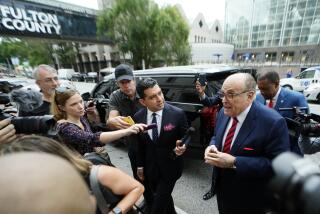Italian Pressure Cited in Iraq Loan Fraud Case
- Share via
WASHINGTON — The Justice Department blocked an attempt by federal investigators to travel to Rome to interview senior officials of an Italian bank that financed Iraqi arms purchases, after repeated complaints from the Italian government, according to documents and interviews.
The Italian ambassador met with high-level State Department officials and with top officials of the Justice Department, according to classified documents, to complain about the criminal investigation of $5 billion in loans to Iraq by the Banca Nazionale del Lavoro, which is owned by the Italian government.
The trip was halted by high-level Justice Department officials in Washington over the objections of prosecutors in Atlanta and officials of the Justice Department’s criminal division after the Italians voiced their complaints, according to documents and a source who asked not to be identified.
The decision was made even though a classified May 29, 1990, State Department memo said that Justice Department officials were “skeptical that the . . . scheme was run entirely by BNL’s branch in Atlanta and that BNL Rome had no knowledge or complicity in the scheme.”
The same memo said that the Italian ambassador met directly with then-Atty. Gen. Dick Thornburgh to discuss the matter.
The visit to Rome was important to a federal indictment of six officials of the Atlanta branch of BNL because the indictment charged that the bankers defrauded BNL by making the loans without the knowledge or authorization of superiors in Rome. If BNL officials in Rome knew of the scheme, there would have been no basis for a significant part of the indictment.
Previous stories in The Times have shown that BNL officials appealed to U.S. officials to go slow on the bank investigation. The newly obtained documents show that Italian government officials also pressured U.S. officials in late 1989 and early 1990.
Atty. Gen. William P. Barr and prosecutors handling the BNL case in Atlanta have denied that political or foreign-policy considerations played a role in the investigation or indictments in the case.
Attempts to reach Justice Department officials and the Italian Embassy on Monday were unsuccessful.
The disclosure of the Italian government’s pressure comes as the political controversy over the Administration’s policy toward Iraq shows signs of heating up. Sen. Al Gore (D-Tenn.), the Democratic vice presidential candidate, is scheduled to make a speech today attacking the Administration’s prewar dealings with the regime of Saddam Hussein and its alleged efforts after the Gulf War to conceal the extent of the assistance.
According to classified documents, Italian Ambassador Rinaldo Petrignani and other Italian officials expressed concern over the BNL investigation in meetings with officials from the Justice and State departments, including Abraham D. Sofaer, a former judge who was then the State Department’s top lawyer.
At the time, federal agents were investigating the illicit loans to Iraq, some of which were guaranteed by the U.S. Agriculture Department’s Commodity Credit Corp. program. A key issue in the investigation was whether officials in Rome knew of the loans.
The Italian government complaints were summarized in a memo prepared on April 2, 1990, for Robert M. Kimmitt, then undersecretary of state for political affairs. He was meeting the next day with Petrignani and the BNL issue was expected to be raised.
“Petrignani met with Judge Sofaer and Department of Justice officials to register serious government of Italy concern over the possible federal indictment of the state-owned BNL whose Atlanta branch is involved in fraudulent loans to Iraq for arms purchases under cover of CCC loan guarantees,” said the classified memo.
The State Department had approved the trip by investigators to Rome in January, 1990. But by the time of the Petrignani-Kimmitt meeting, the Justice Department had delayed the trip.
A February, 1990, Federal Reserve memo said that the trip had been blocked by Thornburgh. Another Federal Reserve memo in April, 1990, complained that the investigation was being hampered by “interference from the Justice Department in Washington.”
Internal Justice Department records show that the Atlanta prosecutors and investigators were still trying to get a final OK for the trip as late as May, 1990, but permission was not granted.
Arthur J. Wade, the senior investigator on the team, testified recently at a sentencing hearing for the former BNL branch manager in Atlanta that the trip was blocked by Justice Department officials in Washington. But he said the bank officials sought by the investigators eventually came voluntarily to the United States to be questioned, so there was no need to make the trip.
Waas is a special correspondent and Frantz is a Times staff writer.
More to Read
Sign up for Essential California
The most important California stories and recommendations in your inbox every morning.
You may occasionally receive promotional content from the Los Angeles Times.










